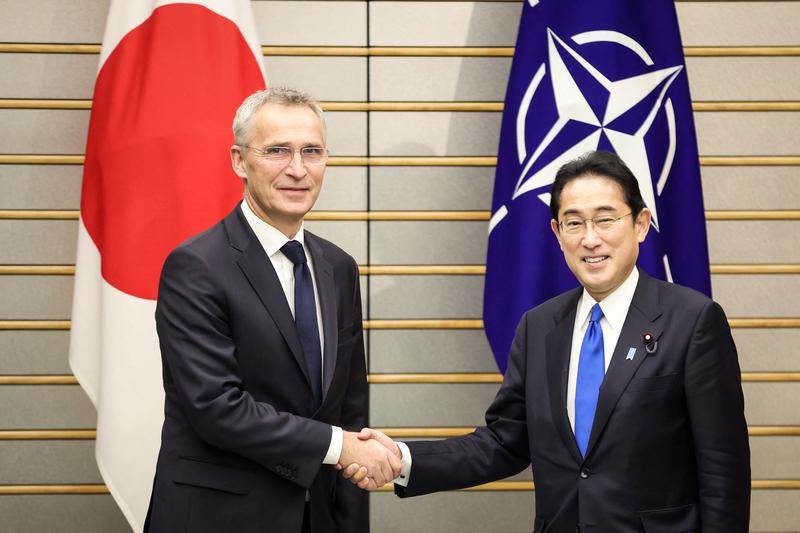
Japanese Prime Minister Fumio Kishida meets with NATO Secretary-General Jens Stoltenberg in Tokyo on January 31. (Photo from Reuters)
By Chen Yang
Japanese Foreign Minister Yoshimasa Hayashi confirmed in an interview that NATO plans to open a liaison office in Japan, according to CNN's report on May 10, who also said that cooperation with NATO has become increasingly important.
For a long time, the interaction between Japan and NATO, which are geographically far apart, was not focused on practical affairs, but staying on a discussion level, that is, to enhance bilateral relations by holding bilateral or multilateral talks. While in November last year, Japan joined the NATO Cooperative Cyber Defense Centre of Excellence (CCDCOE), marking their bilateral interaction progressing in a pragmatic way. NATO's plan to set up a liaison office in Japan this time is also a pragmatic interaction with Japan, a more substantial breakthrough in bilateral relations. Peter Taksøe-Jensen, the Danish ambassador to Japan, believes that "this is more than just a symbolic move. It would be a very visible, real way to strengthen the relations between Japan and NATO."
The establishment of NATO's office in Japan will be the first foothold of NATO's intended expansion in Asia-Pacific. In the future, NATO might set up similar offices in other Asia-Pacific countries, and then realize the penetration of the Asia-Pacific region from point to point. The Nikkei previously reported that NATO will set up an office in Tokyo to conduct regular consultations with major regional partners such as Japan, ROK, and Australia to deal with the traditional opponent Russia and China, the "new challenge". Russian Foreign Ministry spokesperson Maria Zakharova criticized at a press conference on May 10 that NATO's plan to set up an office in Japan "is further proof of NATO's ambitions to entrench in the region to spread an anti-Russia and anti-China agenda."
Japan is an Asian country with lingering militarism, and NATO is the world's largest military organization. The collaboration between the two is definitely not a blessing for the peace and stability of the Asia-Pacific region. In recent years, Japan has vigorously developed its armaments. Despite its national debt constantly setting new historical records, Japan does not forget to increase its defense budget every year and actively cooperates with countries or organizations outside the region to create confrontation and division in the Asia-Pacific region. The latest issue of the magazine Time has an article entitled "Japan's Choice", which introduced that Fumio Kishida "wanted to abandon decades of pacifism and make his country a true military power".
On the other hand, NATO, a product of the confrontation between the US and the Soviet Union during the Cold War, did not disband with the end of the Cold War. Instead, it has maintained its own value and significance by constantly creating "enemies", expanding eastward, and infiltrating globally. The existence of NATO has not only failed to become the anchor of stability in Europe, but has become the initiator of war in Europe. Shigeki Nagayama, a law professor at Tokai University in Japan, once pointed out that welcoming NATO's involvement in the Asia-Pacific region to enhance its defense capabilities will bring new factors of instability to the region. "It has become possible for NATO to intervene in East Asian affairs, which is not a good thing for the stability of East Asia and Europe," said Nagayama.
Asia is a highland of development and promising land for cooperation and should not become an arena for geopolitical competition. Acting as the vanguard of NATO's expansion in Asia-Pacific, Japan has clearly gone the wrong way. Japan's military security has always attracted the attention of its Asian neighbors and the international community due to the history of modern militaristic aggression. What Japan should do is earnestly learn from the lessons of history, stick to the path of peaceful development, and refrain from doing things that undermine mutual trust among countries in the region and damage regional peace and stability.













